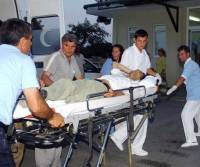Turkish leaders ponder new security measures after bomb attack kills 6, injures 102
Shopkeepers hung Turkish flags on the broken windows of a shopping mall Wednesday to protest a bomb attack that killed six people and injured more than 100 others, as the government pondered new security measures at the start of the tourist season.

The blast Tuesday outside one of the oldest malls in Ankara hurled glass and other debris over a wide area, severely injuring some people and slightly injuring dozens of others, including at least eight Pakistanis.
The Ankara governor's office said a total of 102 people were injured, of whom 10 were in critical condition.
There was no claim of responsibility so far. Kurdish militants who have claimed several such attacks in the past have threatened to stage new ones. Leftist and Islamic militants have also carried out bombings in Turkey.
The prosecutor's office banned the broadcasting of images from the site on grounds that it could hurt public morale, but the ban was not observed by some television channels. Police detained a flag-waving nationalist Turk who wanted to protest the attack early Wednesday.
Foreign Minister Abdullah Gul was chairing an emergency meeting on Wednesday to discuss new security measures. The attack came at the beginning of the tourist season.
Earlier this year, Kurdish militants warned tourists that they could become "targets" if they traveled to Turkey. Separatist Kurdish guerrillas, fighting for autonomy in the southeast, allege that Turkey is using lucrative tourism revenues to maintain its military drive against them.
"Is it a suicide bomber or a parcel bomb? Technical teams are working on this," Erdogan told reporters after visiting the scene. "We have always said terror can strike anyone, anywhere. Although we have taken every precaution, we have experienced this incident."
An anti-terrorism police official, speaking on condition of anonymity, said police were evaluating the possibility of a suicide attack but did not say whether there was any concrete evidence to suggest that.
"Who feeds terrorist groups? Who's behind them? That's what we need to look at," said Gen. Yasar Buyukanit, chief of the military. He did not rule out further attacks.
Previously, Buyukanit has said Europe was not doing enough to prevent sympathizers from providing aid to Kurdish rebel group PKK, deemed a terrorist organization by the United States and the European Union.
The Turkish military has repeatedly said the rebel group is smuggling hundreds of kilograms of plastic explosives into the country from neighboring Iraq, where the guerrillas have been based for decades.
There is growing impatience in Turkey over how to deal with Kurdish rebels, and the government has not ruled out military operations aimed at their bases in northern Iraq. The United States opposes Turkish military action in Iraq, fearing it would complicate U.S. efforts to restore stability there.
Police on Wednesday reinforced security outside the headquarters of the country's largest pro-Kurdish Democratic Society Party against possible violent protests.
The explosion occurred as the city hosted an international defense industry fair, with some 400 companies from dozens of countries displaying their goods.
The site of the explosion was close to the Anatolian Museum of Civilizations where Buyukanit was scheduled to host a reception for visitors of the defense fair.
"We were cleaning the windows when the pressure from the blast pushed us to the ground," said Murat Coskun, who owns a nearby shop that sells cell phones. "Everything was covered in dust. I could only hear people screaming."
The Ulus neighborhood where the blast occurred is the oldest part of Ankara. It is near museums and the old parliament house. The Anafartalar mall that was damaged sells mostly clothing and textiles.
Police increased security across the country as news reports said police were looking for some suspects who allegedly were at the site prior to the bomb attack.
In 2003, al-Qaida-linked suicide truck bombers in Istanbul attacked two synagogues, the British Consulate and a British bank, killing 58 people.
In September, suspected Kurdish rebels set off a bomb at a bus stop in Turkey's largest majority Kurdish city, Diyarbakir, killing 10 people. A month earlier, a hard-line Kurdish militant group claimed responsibility for a bus bombing in the Mediterranean resort of Marmaris that injured 20 people, including 10 Britons.
Subscribe to Pravda.Ru Telegram channel, Facebook, RSS!




